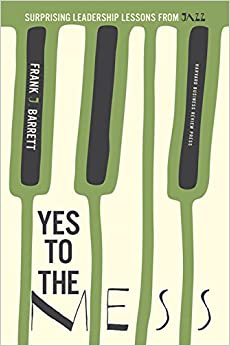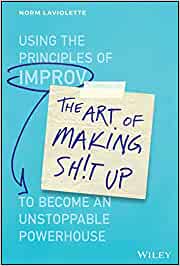I’m back from Billund, where I have attended the 2021 International LEGO Serious Play Conference, and I already published some of my notes in almost real-time, but I have more material and I’ll be publishing it, after some due polishing, between today and tomorrow.
The first set of notes I’d like to share with you is about improvisation and follows the conversation Johan Roos has with Dr. Lukas Zenk on the last day of the conference, as I was able to fully grasp its significance for Real-Time Strategy and LEGO Serious Play only after some ruminating and some additional research.
Lukas Zenk works as an Assistant Professor for Innovation and Network Research at Danube University Krems and he’s the Deputy Head of Research at the Department of Knowledge and Communication Management. He leads a couple of projects specifically revolving around Organizational Improvisation (more information on www.improvisation.science), founded the Lightbox Network (www.lightbox.at), co-created the method Designing.Events (www.designing.events), co-developed the web app Collective Pictures (www.co-pics.com), and co-founded the improvisational theater company Quintessenz in Vienna (www.improvisationstheater.at). An impressive character to say the least.
Lukas Zenk was the “mystery guest” for the last conversation with Johan Roos, joining the conference from Austria to talk about the adaptive quality of improvisation in these trying times. To him, improvisation is about being able to roll with different inputs in an unplanned situation, planning and acting at the same time. A skill that, of course, takes training.
We live in a world that is currently undergoing major changes. Many of our previous plans can no longer continue in this form and we are faced with the challenge of acting in the here and now. Improvisation means dealing with the unforeseen (“improvisus” – the unforeseen).
In our applied research project “Organizational Improvisation”, we investigate the mindset and skills of experts in the arts, science, and business and provide current activities on this website. The aim is to better understand the ability to improvise in different contexts, including improvisational theater, jazz, creativity and innovation, entrepreneurship, as well as emergency forces.
How do experts “think on their feet”, playfully adapt to changing situations and radically collaborate for real-time creativity? These scientific findings will be applied for entrepreneurial purposes to be prepared for the unexpected.
Lukas did research on improvisation as a general behaviour that can be applied in theatre and in business just as much: his research was looking for experts in different fields, working in a similar manner than Mihaly Csikszentmihalyi while developing the flow theory. The idea was to find general patterns in order to be able to train other people to deal with uncertain situations. One of the main aspects seems to be fitting freedom within a structure, grammar, as it’s done in music even in the wildest jam sessions.
Because the environment is changing a lot, organizations need to be able to improvise more and more: it’s more important to be able to deal with a new emerging situation, and recognize the pointlessness of a plan, than following an obsolete plan. A concept we should really make peace with, at least in the construction industry.
Further exploring the material available on www.improvisation.science, there’s a rich section of additional resources, including a Curated Bibliography and what appears to be a live spreadsheet of references curated by Lauren Kondratiev, Lori Pugh, and Lukas Zenk himself.
Browsing through this seemingly infinite list of articles and books, few titles pop to the attention:
- If I Understood You, Would I Have This Look on My Face? by Alan Alda, a witty book on communication that draws from cutting-edge science to classic acting methods;
- An Improv State of Mind: Using the Art and Science of Improvisation to Succeed at Work…and at Life by Jennie Ayers, particularly focused on the organizational side of things;
- Yes to the Mess: Surprising Leadership Lessons from Jazz by Frank J. Barrett, professor of Management e Global Public Policy at the Graduate School of Business and Public Policy of the Naval Postgraduate School in Monterey, California;
- The Secret Language of Leadership: How Leaders Inspire Action Through Narrative by Stephen Denning;
- The Art of Making Sh!t Up: Using the Principles of Improv to Become an Unstoppable Powerhouse by Norm Laviolette;
- The Creativity Leap: Unleash Curiosity, Improvisation, and Intuition at Work by Nathalie Nixon;
- Strategic Management and Organizational Dynamics: The Challenge of Complexity by Ralph D. Stacey;
- The Second City Guide to Improv in the Classroom: Using Improvisation to Teach Skills and Boost Learning by Mary Scruggs and Katherine S. McKnight, although to be honest the bibliography refers to the first edition of this book.
The book Free Play: Improvisation in Life and Art by Stephen Nachmanovitch, suggested by a member of the audience, offers good insight into the relationship between improvisation in music and the kind of skills it builds in life.
These concepts of improvisation in business, being able to “think on our feet”, is of course connected to the whole branch of LEGO Serious Play for Real-Time Strategy (see for instance here) both for the Team and the Enterprise. Those were standard applications of the LEGO Serious Play method and, as far as I’m concerned, I always found the whole Application Technique of the Simple Guiding Principles to be a little lacking. By approaching the whole thing in a more structured way, as I hope I’ll get the chance to tell you, the new Real-Time Change and Readiness for Change frameworks have tremendously improved its chances of success. But this is a conversation for another time.














1 Comment
Pingback:Organisational Improvisation – Shelidon
Posted at 00:01h, 22 September[…] University revolves around Organisational Improvisation. I already talked about it on the blog here, back from the 2021 International LEGO Serious Play Conference in Billund, but today’s […]